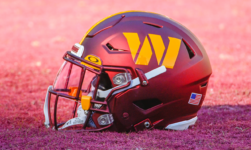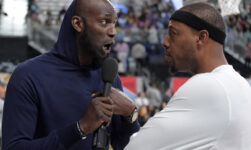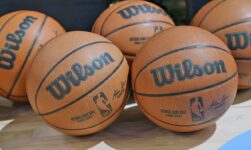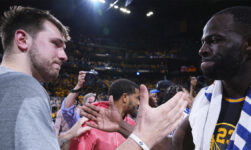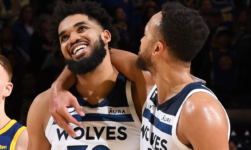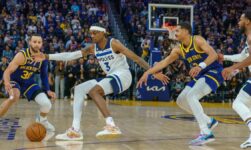One of the prevailing narratives of the 2022 NBA trade deadline is that the newly formed play-in round is causing a glut of buyers and a dearth of sellers. There might be some truth to this, at least on the seller side, but it tells a fairly incomplete story because it paints all buyers in the same light. What’s so fascinating about this year’s deadline is that quite a few teams are fighting for many of the same players for very different reasons.
We certainly don’t lack the traditional sort of buyers. There’s no clear championship favorite, and that is going to empower aggressive general managers. There are plenty of teams that might really be one move away from the title. But what makes the 2022 deadline so interesting are a few trends that have been burbling under the surface of the NBA’s roster-building landscape for the past few years.
Please check the opt-in box to acknowledge that you would like to subscribe.
Thanks for signing up!
Keep an eye on your inbox.
Sorry!
There was an error processing your subscription.
As the league has drifted more and more toward extending contracts before free agency, player movement is getting increasingly restricted to trades rather than free agency. The pitiful 2022 free-agent class is only going to further that trend. Rebuilding through the draft is also proving more difficult than ever. The flattened lottery odds disincentivizing tanking have played a part in that, but there’s more to it. So many teams owe picks that committing to a multiyear draft-based rebuild leaves too much to chance. Even the teams that have their own picks are operating at a disadvantage compared to the few teams that have accumulated historic amounts of draft capital during the trading boom of the past few seasons. Would you like your chances of out-drafting the Thunder when they have three times as many picks?
All of this together makes trading the predominant form of player movement, and even teams that aren’t set on winning the championship right now will certainly have to look to the trade market eventually to build a contending-caliber roster. We’ll therefore split this deadline’s buyers up into three categories. There are the traditional, all-in buyers desperate to win it all as soon as possible. Then there are the flexible buyers that are capable of winning now or down the line. Finally, there are the wild-card buyers that are lower in the standings, but still want to add talent for future seasons.
The all-in buyers
Needs: Defense; size; shootingRestrictions: Can’t trade a first-round pick until 2028; $35 million over luxury tax lineNotable assets: Nicolas Claxton, Cameron Thomas, Day’Ron Sharpe
Brooklyn’s predicament is unpredictability. The Nets have no idea whether or not Kyrie Irving will be available for home games in the playoffs. They don’t know what version of James Harden they’ll have, and after yet another setback, it isn’t clear when they’ll have Joe Harris either. It’s hard to upgrade on a team you don’t even know you have. That’s what the Nets are trying to do. Their defense ranks 28th over the past month. Their spacing without Harris has been atrocious, and without Jeff Green, going small in the postseason is going to cause real problems on either offense or defense, depending on the rest of the lineup’s construction. How Brooklyn prioritizes these flaws is going to determine its approach to the deadline.
More on NBA
Barring a surprise Harris trade, the big-ticket items are probably off the table. Matching salary on someone substantial might not even be possible without including Bruce Brown in a deal. The reasonably-priced Justin Holiday would’ve been perfect … but he’s not vaccinated. Kenrich Williams is within their price range, but a 2028 first-round pick is a hefty price to pay for someone with such a limited track record. Watch out for Serge Ibaka on the buyout market. The Clippers can save tens of millions of dollars by dumping him into Oklahoma City’s cap space. If they do and he secures a buyout, the Nets would appear to be the front-runners for him considering how heavily they pursued him as a 2020 free agent.
If the Bucks package DiVincenzo with George Hill, they scrounge together enough salary to add a $12M-$13M player. That’s not bad. Keep an eye on Robert Covington in this respect. He’s not nearly the man defender that Tucker was, but he’s a better offensive player and is a stellar help defender. More pressingly, he can protect the rim.
That’s a badly needed supplementary skill set in Milwaukee if Lopez isn’t going to return. It’s unclear what sort of timeline he’s operating under, but if the Bucks are afraid he isn’t coming back, they have to at least consider the idea of moving him for a comparable salary. Lopez and DiVincenzo combine to make roughly $18 million, enough for a run at Eric Gordon if the Bucks want more shot creation. No matter what they do, the Bucks have the ammunition for only one real swing. If they take it, they have to make it count.
Needs: One more shot creatorRestrictions: Can’t trade a first-round pick until 2028 unless they remove protections on 2023 pick owed to Oklahoma City; $350,000 below luxury tax line; $6.7 million below hard cap lineNotable assets: Max Strus, Caleb Martin, Gabe Vincent, Duncan Robinson(?)
Remember, the Heat will have Victor Oladipo back soon enough. That’s a low-risk, high-reward midseason addition already in the chamber, and possibly the answer to any lingering questions on either end of the court. Miami’s 2021 postseason was brief in large part because Giannis Antetokounmpo swallowed Jimmy Butler whole on defense. If he does the same this season and Jrue Holiday has a similar effect on Tyler Herro, the Heat are going to need someone else to generate shots. That could be Oladipo. He could also be an excellent perimeter complement to their defensive frontcourt.
Should the Heat look to the trade market, their salary structure and hard cap limitation make Duncan Robinson the only real candidate for a deal. Getting off the five-year, $90 million pact he signed in the offseason might not be a bad idea with a lucrative extension surely looming for Herro. A Robinson-for-Gordon swap probably doesn’t interest either side, but it would give the Heat that extra dose of ball-handling they’d like. Max Strus certainly looks ready for a bigger role, and a Robinson deal could give it to him.
Needs: Perimeter defense; backup centerRestrictions: Can’t trade a first-round pick until 2028; $15 million over luxury tax lineNotable assets: None
Losing Joe Ingles, the player, is going to hurt Utah’s offense, but the truth was that his expiring salary made him by far the most likely Jazz player to be dealt even before he got injured. That injury just pushes those trade odds up, especially with the Jazz collapsing before our eyes. Utah sorely needs a perimeter defender. Rudy Gobert can’t deter everything in the paint, so having someone capable of denying dribble penetration would be really helpful.
The protections on the first-round picks the Jazz owe Memphis and Oklahoma City would make a significant addition very difficult. Depending on how the protections on those picks shake out, Utah might only be able to send out a single first-rounder. That’s probably not landing Jerami Grant. The Jazz might not be able to do better than someone like Justin Holiday or Gary Harris. Both could help. Neither fix what ails these Jazz.
Needs: Perimeter defense; shooting; forward-sized humansRestrictions: Can’t trade a first-round pick until 2027; $20 million over luxury tax lineNotable assets: Talen Horton-Tucker, Austin Reaves
Does anyone want Talen Horton-Tucker? Anyone at all? The asset once too prized to be dealt for Kyle Lowry suddenly feels incapable of landing any upgrade of note even with a potentially very valuable 2027 first-round pick attached. If that’s the case, Jerami Grant is off the table. So is Harrison Barnes. Ironically, undrafted rookie Austin Reaves might be too valuable to the current team to put into trade offers. Even if he helps the Lakers land a notable player, that player would have to replace his production on top of whatever else the Lakers ask of him.
Buddy Hield is the name to watch here, because, boy, is he doing everything in his power to lower his trade value enough to get out of Sacramento. He’s shot 10 of 47 from the field in his last five games — all Kings losses. The Lakers seemingly have an offer on the table involving Horton-Tucker. The Kings have reportedly rejected that offer. If there was a better one on the table, we’d likely have heard about it by now. Would they truly pass on the chance to get out of the two years and $38 million remaining on his contract? We’ll find out at the deadline.
The flexible buyers
Needs: Bench defense; backup point guardRestrictions: Can’t trade a first-round pick until 2024; $7 million below luxury tax lineNotable assets: Jalen Smith
We’re grasping at straws for needs here. Phoenix is good at basically everything. Cameron Payne’s declining shooting numbers open the door for an upgrade, and the memories of Antetokounmpo bulldozing their bench will surely motivate the front office to seek frontcourt fortifications, but the Suns just had a 13-1 January in which DeAndre Ayton played only four times. They’re more than capable of winning it all as-is.
Spurs forward Thaddeus Young is the name to watch here. He’s one of the few available defenders with a real track record of bothering Giannis, and Phoenix can match his salary easily enough with Jalen Smith and Dario Saric. One first-round pick should be more than enough to seal a deal here. Until the Suns are linked to anyone else, Young should be considered their likeliest trade candidate.
Needs: Someone to defend Giannis Antetokounmpo and Joel Embiid; forwards; stopgap perimeter defenseRestrictions: Can’t trade any of their own first-round picks (but can trade a lottery-protected pick from Portland); $3 million below luxury tax line; $9.7 million below hard capNotable assets: Patrick Williams, Coby White, Ayo Dosunmu
A touch of irony: Young is exactly the sort of defender Chicago needs right now, but the Bulls can’t legally acquire him because they had him less than a year ago. He was dealt out in the DeMar DeRozan deal and cannot be reacquired by the Bulls until the offseason. Jerami Grant and Harrison Barnes might be gettable in a Patrick Williams-centric deal, but neither is going to do much deter Antetokounmpo or Joel Embiid in a playoff series. The sort of player they really need probably isn’t out there.
That’s not the end of the world. This team is relatively young and has a window here. For now, the Bulls can afford to wait on their young players to develop and perhaps seek an extra depth piece while they await the returns of Alex Caruso and Lonzo Ball. They’ve surely put in a call to Oklahoma City about Williams, and if the price dips below a first-round pick, Chicago should be at the front of that line.
Golden State had a playoff offense problem well before Stephen Curry forgot how to shoot. As superfluous as the addition of Kevin Durant to a 73-win team felt, he was the primary late-game shotmaker for a reason. Curry, for all of his gifts, is only 6-foot-3, and players that small typically struggle to generate good shots in the sort of slow, iso-heavy possessions that dominate the late stages of playoff games. Another dribbler would be welcome here. So would a center. Kevon Looney and James Wiseman don’t stand a chance against Nikola Jokic or Anthony Davis, and Draymond Green can’t play all 48 minutes.
Golden State’s commitment to its bridge players is going to get tested between now and the deadline. The Suns have clearly separated themselves from the Warriors and the rest of the West. The Warriors can level the playing field by dangling Wiseman and Moody. A healthy Myles Turner would fit on both ends of the floor, for example, but the Warriors seem determined to retain their youth at all costs. If Golden State can’t find itself between now and May, the cost might be the 2022 championship.
Needs: A long-term, versatile forward; shootingRestrictions: NoneNotable assets: Basically the entire roster
No adequate explanation for why Memphis isn’t an ideal Jerami Grant destination has yet been offered. The Grizzlies run a fairly egalitarian offense that is seemingly capable of accommodating Grant’s desire for shots. He’d fill their hole at forward, likely starting games at the 3 and closing at the 4. His extension, while pricey, would likely be manageable with Jaren Jackson Jr. now playing on what looks to be a below-market deal of his own. The Grizzlies have the draft picks to make a major trade. They have more than enough young depth pieces to offer as well.
But the Grizzlies don’t want to rush. That’s a justifiable stance. They’re positioned to pick their forward of choice in the coming years when that player becomes available. For now, what has flown under the radar for the surprisingly successful Grizzlies is how many of them are shooting worse than they did last season. Jackson, Dillon Brooks, Kyle Anderson and De’Anthony Melton have all taken steps back. If there’s a smaller move to be made here, it would be for a Grayson Allen replacement.
The Mavericks have to decide what kind of roster they want to have for the foreseeable future. Jalen Brunson and Dorian Finney-Smith will both be free agents this offseason. Re-sign them and the Mavericks are essentially locked into this roster for the next few years. That seemed far less appealing a month ago, before the Mavericks turned into the 2004 Pistons defensively. If Dallas thinks this is sustainable, it might be comfortable delaying the pursuit for a star-level co-pilot for Luka Doncic.
But this is the Mavericks we’re talking about here. Mark Cuban broke up a literal championship team to go big-game hunting a decade ago. If someone makes a compelling enough offer for Brunson or Finney-Smith, the Mavericks are going to listen. Dallas was linked to Myles Turner before his injury. It will sniff around all of the deadline’s usual suspects just to cover its bases. The Mavericks aren’t just deciding if they want to retain Brunson and Finney-Smith. They’re comparing them to every available replacement just to make sure they’re making an informed decision.
Needs: Guards; perimeter defense; patienceRestrictions: $4 million below luxury tax lineNotable assets: Collin Sexton
Cleveland hasn’t made the playoffs without LeBron James since 1998, and making the playoffs with James comes with strings. The Cavs spent the better part of LeBron’s first tenure and all of his second one selling off future assets for immediate gratification. The Lakers are trying to do just that as we speak. The current Cavs probably shouldn’t. Darius Garland and Evan Mobley could have a decade of winning ahead of them. The time to strike probably isn’t now. If anything, it’s the summer of 2023, when the Cavs are set to have max cap space and an old friend, who once planned to finish his career in Cleveland, is set to become a free agent.
That said, the Cavs are almost certainly going to make the playoffs, and when they get there, they’d probably like another guard to help replace the injured Collin Sexton and Ricky Rubio. Using Rubio’s expiring contract with some draft picks might be worthwhile to bring Gordon into the fold since he could also help next year without hurting that 2023 cap space. Sexton is something of a wildcard here. Some team is going to be more comfortable paying him in the offseason than Cleveland is, and might give up some assets for his Bird rights now rather than waiting until free agency. That would be a clever way for the Cavs to recoup whatever they lose trading for another guard.
The wild-card buyers
Needs: Defense; stopgap guard play; tax reliefRestrictions: $3 million over luxury tax lineNotable assets: CJ McCollum, Norman Powell, Robert Covington, Jusuf Nurkic
Good grief, Portland’s situation is complicated. The Blazers don’t seem ready to rebuild. They also don’t have a permanent general manager. They surely want to use Robert Covington or Jusuf Nurkic to get below the tax line, but losing their Bird rights is going to make winning with Damian Lillard next season more difficult. For now, that appears to be Portland’s goal … yet it might be willing to surrender its second-best player in the process.
If impending restricted free agent Anfernee Simons is really a 25-point scorer on a consistent basis, McCollum finally becomes undeniably redundant. There isn’t a clear win-now trade for him on the table yet, but that’s what the Blazers are going to look for if they make a deadline deal. Does that make them buyers, or sellers? You decide. The likeliest outcome here is a wholesale roster turnover in the offseason when a new general manager has been hired, but if Joe Cronin wants to land the full-time gig, turning McCollum into a comparable forward on a better contract would probably go a long way toward that goal.
You know who could use McCollum’s scoring? New Orleans! A Josh Hart-centric package has been rumored, but probably isn’t enough without substantial draft capital attached. The Pelicans might be willing to give it up. David Griffin may well be fighting for his job here, and even if a play-in berth does little for their long-term prospects, the optics would go a long way for this front office.
That doesn’t mean McCollum is the only target. Turner, particularly if Indiana’s price has gone down in the wake of his injury, would also make plenty of sense as a long-term 3-and-D center to play alongside Zion Williamson. Such a move might also buy the front office a bit more runway. The Pelicans have the draft picks to acquire almost anyone on the market. Expect them to at least try to cash some of those picks in for real players.
Needs: Defense; shooting; synergyRestrictions: $6 million below luxury tax lineNotable Assets: Everyone on the team
Should the Kings be so desperate to end their seemingly unendable 16-year postseason drought? Probably not. There’s not much honor in getting swept by the Suns even if Sacramento could sneak through the play-in round. But the Kings are not now, nor have they ever been, rational actors. That puts almost anything on the table as the deadline approaches. The Kings have gone out of their way to negotiate through the media in recent weeks. That they feel the need to announce to the world that Ben Simmons is off the table and that De’Aaron Fox pretty glaringly suggests that major moves are at least under consideration.

